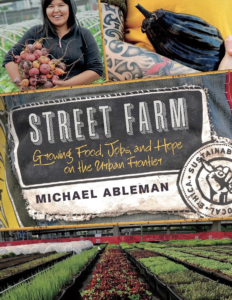
22 Nov The First Great Crop on Skid Row
 Excerpted from “Street Farm: Growing Food, Jobs, and Hope on the Urban Frontier” by Michael Ableman (Chelsea Green, 2016).
Excerpted from “Street Farm: Growing Food, Jobs, and Hope on the Urban Frontier” by Michael Ableman (Chelsea Green, 2016).
It’s a big day, our first large harvest since our little fledgling farm was planted, and Seann, Kenny and I, together with the rest of our newly-hired crew are gathering rainbow chard, lacinato kale, French breakfast radish, and collard greens for the afternoon market held a few blocks away in front of the train station.
We’ll soon be selling our harvest right there, to business people fresh from their high-rise office buildings, travelers getting on or off trains or buses that stop a short distance from our stall, and residents from nearby apartments and condominiums. Sole Food gives “local” a whole new meaning, as the produce on our market tables is harvested within walking distance down the street.
On the farm, we break off stems and leaves, pull roots, make bunches, and pile them into nearby boxes. It’s a familiar rhythm for me, with familiar crops, and I realize there are probably hundreds of farmers at this very moment doing exactly the same thing—except accompanied by birds singing or wind rustling trees rather than the non-stop clamor of traffic and sirens and hustle.
We interrupt harvesting for one of our farm walks, a chance for me to share some techniques, a little philosophy, answer questions, and tell stories. And I realize that even as I am telling stories to make abundance real and visual for folks who may never have experienced it, I am feeling my own doubts and questions about what lies ahead. It feels odd for me standing in this parking lot on a street corner talking about soil microbes, optimal plant spacing, or the life cycle of an aphid. On my rural farm, not far from here, I’d be carrying on similar conversations, but there I’m mentoring young, well-scrubbed kids fresh out of college, most of whom have never known real hardship, all still hopeful and idealistic, too young for life to have slapped them around.
In most farming ventures that involve breaking new ground, the initial results can be fantastic, all that untapped soil fertility. We found that here as well. Kenny and the rest of the crew were making out well, our early plantings had thrived. The bunching greens produced huge leaves pulsing with vitality and color, radishes seemed to jump out of the ground, and tomatoes and peppers grew and flowered and produced with total abandon.
I knew our funders, our staff, and the broader community had been waiting for this—waiting, and watching, and expecting. It was overwhelming to consider that we were attempting to supply Vancouver’s top restaurants and farmers markets with production quantities of food grown on a parking lot, with workers who had some significant challenges. Not to mention grow some hope and healing for our staff and the broader community in the process.
So it was a relief to witness such fecundity and productivity and blatant health in the midst of the struggles of this neighborhood. I knew this first great crop was important for our crew, too. They needed to see something thriving and working. I suspect this is why many of those who were on that first farm crew, people who may not have kept a job for very long—people like Kenny—are still employed with us after all these years. Early success was essential. And we got it.
 Excerpted from “Street Farm: Growing Food, Jobs, and Hope on the Urban Frontier” by Michael Ableman (Chelsea Green, 2016).
Excerpted from “Street Farm: Growing Food, Jobs, and Hope on the Urban Frontier” by Michael Ableman (Chelsea Green, 2016).
Street Farm is the inspirational account of residents in the notorious Low Track in Vancouver, British Columbia―one of the worst urban slums in North America―who joined together to create an urban farm as a means of addressing the chronic problems in their neighborhood. It is a story of recovery, of land and food, of people, and of the power of farming and nourishing others as a way to heal our world and ourselves.
Michael Ableman is a farmer, author, photographer and urban and local food systems advocate. Michael has been farming organically since the 1970′s and is considered one of the pioneers of the organic farming and urban agriculture movements. Ableman is a frequent lecturer to audiences all over the world, and the winner of numerous awards for his work.



No Comments